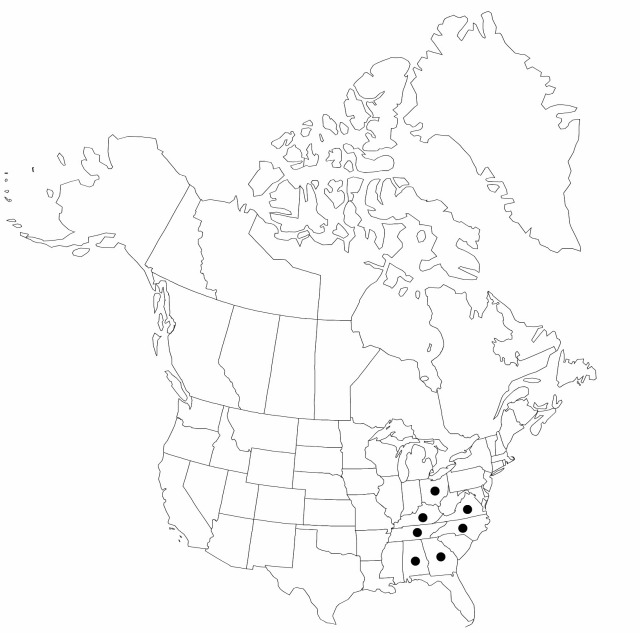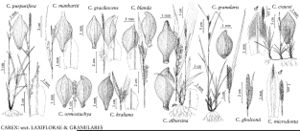Difference between revisions of "Carex purpurifera"
in J. K. Small, Man. S.E. Fl., 216, 1503. 1933.
FNA>Volume Importer |
imported>Volume Importer |
||
| (2 intermediate revisions by 2 users not shown) | |||
| Line 1: | Line 1: | ||
{{Treatment/ID | {{Treatment/ID | ||
|accepted_name=Carex purpurifera | |accepted_name=Carex purpurifera | ||
| − | |accepted_authority=Mackenzie | + | |accepted_authority=Mackenzie |
|publications={{Treatment/Publication | |publications={{Treatment/Publication | ||
|title=in J. K. Small, Man. S.E. Fl., | |title=in J. K. Small, Man. S.E. Fl., | ||
|place=216, 1503. 1933 | |place=216, 1503. 1933 | ||
|year=1933 | |year=1933 | ||
| + | }} | ||
| + | |special_status={{Treatment/ID/Special_status | ||
| + | |code=F | ||
| + | |label=Illustrated | ||
| + | }}{{Treatment/ID/Special_status | ||
| + | |code=E | ||
| + | |label=Endemic | ||
}} | }} | ||
|basionyms= | |basionyms= | ||
| Line 31: | Line 38: | ||
-->{{#Taxon: | -->{{#Taxon: | ||
name=Carex purpurifera | name=Carex purpurifera | ||
| − | |authority=Mackenzie | + | |authority=Mackenzie |
|rank=species | |rank=species | ||
|parent rank=section | |parent rank=section | ||
| Line 44: | Line 51: | ||
|publication title=in J. K. Small, Man. S.E. Fl., | |publication title=in J. K. Small, Man. S.E. Fl., | ||
|publication year=1933 | |publication year=1933 | ||
| − | |special status= | + | |special status=Illustrated;Endemic |
| − | |source xml=https:// | + | |source xml=https://bitbucket.org/aafc-mbb/fna-data-curation/src/2e0870ddd59836b60bcf96646a41e87ea5a5943a/coarse_grained_fna_xml/V23/V23_801.xml |
|genus=Carex | |genus=Carex | ||
|section=Carex sect. Laxiflorae | |section=Carex sect. Laxiflorae | ||
Latest revision as of 20:43, 5 November 2020
Culms densely tufted, erect, ascending, rarely decumbent, 28–56 cm × 0.7–1.2 mm. Leaves: basal sheaths purple; sheaths 7–54 mm; blades erect or ascending, midrib well developed especially abaxially, 2 lateral veins developed adaxially, flat, 24–48 cm × 5–10 mm, dead leaves lateral to new clumps; blade of owerwintered leaves desnsely papillose abaxially. Inflorescences: peduncles of pistillate spike absent; of terminal spike (0.4–)3.1–5.4(–15.7) cm. Bracts 0.14–0.92 cm × 2–3.5 mm, bract blade of distal lateral spikes linear, narrower than spikes; widest bract blade of distalmost lateral spike 0.5–3.4 mm wide. Spikes usually 4 per culm; lateral spikes 14–45 × 2.2–4.5 mm; terminal spike linear, 12–32 × 2–3.5 mm; exeeding bract blade of distalmost lateral spike. Pistillate scales 3–5 × 1.4–2 mm, apex acute to aristate, awn to 2 mm, serrulate. Staminate scales 7–11 × 1.2–2 mm, margins hyaline or purplish. Anthers 3.2–4 mm. Perigynia 4–16 per spike, loosely overlapping, ratio of longer lateral spike length to perigynia number 1.9–3.4, finely, conspicuously (22–)25–32-veined, oblong-elliptic, 3.6–4.1 × 1.8–2.2 mm; beak slightly curved, 0.8–1.4 mm. Achenes ovate, 3.4–3.8 × 1.6–2 mm. 2n = 34, 36, 38.
Phenology: Fruiting spring.
Habitat: Moist, deciduous or, rarely, mixed deciduous-evergreen forests, around limestone escarpments, washes, sinks, and cave entrances
Elevation: 200–1100 m
Distribution

Ala., Ga., Ky., N.C., Ohio, Tenn., Va.
Discussion
Selected References
None.
